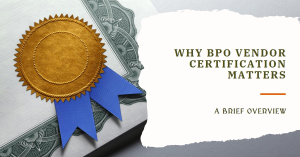In today’s fast-paced and competitive business landscape, companies are constantly seeking ways to optimise their operations, reduce costs, and boost efficiency. One increasingly popular strategy that has gained widespread attention is outsourcing. Outsourcing can be a game-changer for businesses, allowing them to focus on their core competencies while leveraging the expertise of external professionals. However, successful outsourcing isn’t just about finding the right service provider; it starts with selecting the right outsourcing consultant.
Outsourcing decisions can profoundly impact a company’s bottom line and overall success. The right outsourcing consultant serves as a strategic partner, guiding businesses through the complex process of selecting and managing outsourcing vendors. Whether you’re considering outsourcing for the first time or looking to improve your existing outsourcing strategy, this blog will serve as your essential section for making informed decisions.
Before diving into the intricacies of choosing the right outsourcing consultant, it’s crucial to understand why outsourcing matters in today’s business world. Outsourcing is more than just a cost-cutting measure. It’s a strategic move that can provide businesses with access to specialised skills, reduce overhead costs, and increase flexibility. It allows companies to tap into a global talent pool, scale operations efficiently, and stay agile in a rapidly changing marketplace.
While the benefits of outsourcing are clear, the process itself can be daunting. There are numerous aspects to consider, from defining your outsourcing objectives and selecting the right vendors to managing ongoing relationships and mitigating risks. This is where an outsourcing consultant comes in. They act as a bridge between your company and potential outsourcing partners, ensuring that your goals align with the services offered.
Selecting the right outsourcing consultant is a critical step in your outsourcing journey. They are the architects of your outsourcing strategy, helping you navigate the complex terrain of vendor selection, contract negotiation, and ongoing management. In this blog series, we will delve into the key factors that should section your decision-making process. From evaluating a consultant’s experience and expertise to understanding their approach to risk management and cost optimization, we’ll leave no stone unturned in helping you make the best choice for your business.
The Role of Outsourcing Consultants
Outsourcing has become a pivotal strategy for businesses aiming to optimise their operations, reduce costs, and enhance efficiency. To navigate this complex terrain successfully, companies often turn to the expertise of outsourcing consultants.

An outsourcing consultant, often referred to as an outsourcing advisor or consultant for outsourcing, is a seasoned professional who specialises in helping businesses make informed decisions about outsourcing. They serve as outsourcing specialists, offering guidance and consultancy services tailored to a company’s unique needs. These professionals possess extensive expertise in outsourcing management and strategic outsourcing, making them the top outsourcing consultants in the industry.
Adding Value through Expertise
Outsourcing consultants provide invaluable expertise to businesses at every stage of the outsourcing process. Their outsourcing consultancy services encompass a wide array of tasks, including outsourcing analysis, outsourcing support, and outsourcing recommendations. By leveraging their outsourcing expertise, these consultants enable companies to make well-informed decisions that align with their strategic objectives.
One of the key benefits of hiring an outsourcing consultant is their ability to swiftly decipher a business’s outsourcing needs and match them with appropriate outsourcing solutions. They act as outsourcing strategists, helping companies identify the most suitable outsourcing partners and ensuring that the outsourcing benefits are realised to their fullest potential.
Addressing Common Challenges
Outsourcing can be a daunting endeavour, and many businesses face common challenges when embarking on this journey. Outsourcing consultants play a pivotal role in mitigating these challenges. For instance, they assist in outsourcing decision-making by conducting in-depth outsourcing vs. in-house analysis, helping companies understand the cost-effectiveness and feasibility of outsourcing specific tasks or functions.
Furthermore, outsourcing consultants serve as valuable partners in ensuring the success of outsourcing partnerships. They offer outsourcing management tips and insights, helping businesses navigate the intricacies of working with external vendors. By staying abreast of outsourcing trends in 2023 and leveraging outsourcing case studies and outsourcing success stories, consultants help their clients make data-driven decisions and avoid potential pitfalls.
For small businesses and startups seeking affordable outsourcing experts in 2023, finding the right outsourcing partner is paramount. Outsourcing consultants, with their outsourcing consultancy services and outsourcing decision-making sections, stand ready to empower these businesses to make informed and successful outsourcing decisions.
Identifying Your Outsourcing Needs
Understanding your specific outsourcing requirements is a pivotal first step in the journey toward successful outsourcing. It’s not just about finding an outsourcing consultant; it’s about aligning your outsourcing goals with your overall business objectives.
Importance of Understanding Your Outsourcing Needs
Before you dive into the world of outsourcing, it’s crucial to comprehend why identifying your outsourcing needs is so important. Doing so serves as the foundation for building a robust outsourcing strategy. Without this clarity, you risk making hasty decisions that may not align with your business’s objectives, potentially leading to wasted resources and missed growth opportunities.
Factors to Consider When Identifying Needs
To help you navigate the process of identifying your outsourcing needs, consider the following checklist of factors:
- Core Competencies: Evaluate which tasks or functions are outside your company’s core competencies and could benefit from outsourcing. This includes considering tasks like IT support, customer service, or back-office functions.
- Cost Analysis: Assess the cost implications of outsourcing versus handling tasks in-house. Take into account factors such as labour costs, infrastructure, and technology requirements.
- Scalability: Determine whether your outsourcing needs are temporary or long-term. Scalability is essential to adapt to changing business demands.
- Quality Standards: Define your quality standards and expectations for outsourcing partners. Ensure they align with your brand’s reputation and customer expectations.
- Data Security: For sensitive operations, prioritise data security. Ensure your outsourcing partner can meet or exceed your data protection requirements.
- Geographic Location: Consider whether you prefer offshore, nearshore, or onshore outsourcing, taking into account language, time zone, and cultural considerations.
Aligning Outsourcing Goals with Business Goals
To achieve the most significant benefits from outsourcing, your outsourcing goals should seamlessly align with your broader business objectives. Here’s how to ensure this alignment:
- Strategic Integration: Ensure that your outsourcing strategy integrates with your company’s overall strategic plan. Your outsourcing consultant, often referred to as a consultant for outsourcing, can help you align these elements.
- Key Performance Indicators (KPIs): Define KPIs that align with your outsourcing goals. Whether it’s cost reduction, improved customer service, or accelerated product development, these KPIs will help measure success.
- Regular Evaluation: Continuously assess your outsourcing strategy to ensure it remains aligned with your business goals. Seek professional outsourcing consultants to provide ongoing guidance and support.
Understanding your specific outsourcing needs is paramount for a successful outsourcing venture. By following a checklist of critical factors and ensuring your outsourcing goals are in sync with your broader business objectives, you can make informed decisions that lead to cost-effective, efficient, and strategically sound outsourcing solutions. This approach, sections by top outsourcing consultants, will help you unlock the true benefits of outsourcing for your organisation.
Researching Potential Consultants
In the world of outsourcing, selecting the right outsourcing consultant can be the difference between success and disappointment. Thorough research is the cornerstone of this crucial decision-making process.

The Importance of Thorough Research
Before entrusting your outsourcing strategy to a consultant, it’s imperative to conduct in-depth research. This process ensures that your outsourcing consultant possesses the expertise and experience necessary to guide your business effectively. Thorough research minimises risks and maximises the potential benefits of outsourcing, including cost savings, efficiency, and access to specialised skills.
Sources for Finding Outsourcing Consultants
- Online Searches: Start your quest for the ideal outsourcing consultant with online searches. Utilise search engines and include specific keywords like “outsourcing consultant for small businesses” or “best outsourcing advisors in 2023” to narrow down your options.
- Referrals: Seek recommendations from colleagues, business associates, or industry peers who have successfully outsourced in the past. Referrals can be a valuable source for finding reliable outsourcing experts.
- Industry Associations: Many industry-specific associations maintain directories of professional outsourcing consultants. These organisations can be trusted sources for identifying consultants with a strong track record in your industry.
Creating a Shortlist of Potential Consultants
Creating a shortlist of potential consultants is a pivotal step in the research process. Here are some tips to help you make an informed selection:
- Check Credentials: Review the qualifications and certifications of potential consultants. Look for affiliations with industry associations or recognition as top outsourcing consultants.
- Experience and Expertise: Assess their experience in your specific industry and the outsourcing solutions they have provided to clients. Consider their outsourcing management tips and strategies.
- Client References: Request client references and testimonials to gauge their performance and client satisfaction. Reading outsourcing consultant reviews can provide valuable insights.
- Alignment with Goals: Ensure that the consultant’s expertise aligns with your outsourcing goals and objectives. They should understand your unique business needs and challenges.
- Communication Skills: Effective communication is crucial. The consultant should be able to explain complex outsourcing processes and strategies clearly and understandably.
- Cost Structure: Understand their fee structure and how it aligns with your budget. Consider the potential return on investment from their services.
By following these research steps and tips, you can create a shortlist of potential outsourcing consultants who not only possess the outsourcing expertise and professional outsourcing consultancy services you need but also align with your business goals. Remember that finding the right outsourcing partner is not just about hiring a consultant; it’s about forging a strategic partnership that leads to the successful execution of your outsourcing strategy.
Evaluating Consultant Qualifications
Selecting the right outsourcing consultant is a critical decision that can significantly impact your outsourcing strategy. To make an informed choice, it’s essential to evaluate the qualifications and expertise of potential consultants.

Key Qualifications and Expertise
When evaluating outsourcing consultants, consider the following key qualifications and expertise:
- Industry Knowledge: Look for consultants with a deep understanding of your industry. Industry-specific knowledge allows them to tailor outsourcing strategies to your unique challenges and opportunities.
- Experience: Experience is a vital factor. Experienced consultants have encountered various outsourcing scenarios, giving them the expertise to navigate complex outsourcing processes effectively.
- Certifications: Check for certifications relevant to outsourcing, such as Certified Outsourcing Professional (COP) or industry-specific certifications. Certifications indicate a commitment to professional development and adherence to industry standards.
- Proven Track Record: Evaluate the consultant’s past performance by reviewing case studies and success stories. Assess their ability to deliver tangible results, such as cost savings or efficiency improvements.
- Client References: Request client references and speak with previous clients to gain insights into the consultant’s professionalism, communication skills, and the overall value they provided.
Importance of Industry Knowledge, Experience, and Certifications
Industry knowledge, experience, and certifications are essential because:
- Industry Knowledge: Consultants with industry-specific knowledge can identify outsourcing solutions that align with your business’s unique needs and regulatory requirements. They understand the challenges and opportunities within your industry, ensuring more tailored outsourcing strategies.
- Experience: Experienced consultants bring a wealth of practical knowledge to the table. They’ve encountered diverse outsourcing scenarios, allowing them to anticipate challenges, mitigate risks, and provide strategic outsourcing solutions.
- Certifications: Certifications demonstrate a commitment to excellence and adherence to industry best practices. Certified consultants are more likely to offer professional outsourcing consultancy services, ensuring a high standard of work.
Checklist for Evaluating Consultant Qualifications
Use the following checklist to systematically evaluate consultant qualifications:
- Industry Relevance: Does the consultant have expertise in your specific industry, including knowledge of industry trends and challenges?
- Experience: How many years of experience does the consultant have in outsourcing? Have they worked with businesses of a similar size and complexity?
- Certifications: Does the consultant hold any relevant certifications or memberships in professional organisations related to outsourcing?
- Client References: Can the consultant provide client references, and are these references willing to share their experiences with you?
- Case Studies: Review any case studies or success stories that demonstrate the consultant’s ability to deliver results.
- Communication Skills: Assess the consultant’s communication skills. Are they able to explain complex outsourcing concepts clearly and concisely?
- Customization: Does the consultant offer tailored outsourcing guidance and solutions that align with your business’s specific goals and challenges?
Evaluating consultant qualifications is a crucial step in selecting the right outsourcing consultant for your business. By considering industry knowledge, experience, certifications, and other qualifications, you can make an informed decision that leads to a successful outsourcing strategy. Remember that the right consultants, with their outsourcing expertise and recommendations, can be a valuable partner in achieving your outsourcing goals and realising the benefits of strategic outsourcing.
Negotiating Terms and Contracts
Negotiating terms and contracts with your selected outsourcing consultant is a critical phase in your outsourcing journey. It’s essential to ensure that both parties have a clear understanding of the agreement and that the contract reflects a fair and mutually beneficial partnership.
Guidance on Negotiating Terms and Agreements
- Open Communication: Begin negotiations with open and transparent communication. Clearly articulate your expectations, goals, and any specific requirements you have in mind. Encourage the outsourcing consultant to do the same.
- Pricing and Payment Structure: Pricing is a critical aspect of any outsourcing contract. Negotiate pricing that aligns with your budget while ensuring that the consultant receives fair compensation. Discuss the payment structure, including any upfront fees or milestone payments.
- Scope of Work: Define the scope of work in detail. Specify the tasks or services the outsourcing consultant will provide, along with any deliverables or deadlines. Clarity in the scope of work helps prevent misunderstandings later.
- Performance Metrics: Establish clear performance metrics and key performance indicators (KPIs) that will be used to assess the consultant’s performance. This ensures that both parties have a shared understanding of success criteria.
- Timeline: Negotiate a realistic timeline for the project or engagement. Consider potential delays and contingencies to avoid unrealistic expectations.
- Confidentiality and Data Security: Address confidentiality and data security concerns. Ensure that the consultant agrees to maintain the confidentiality of your sensitive information and follows appropriate data security protocols.
Key Contract Elements
When drafting your outsourcing contract, include the following key elements:
- Parties Involved: Identify both parties in the contract, including legal names and contact information.
- Scope of Work: Provide a detailed description of the scope of work, outlining the tasks, responsibilities, and deliverables.
- Pricing: Specify the pricing structure, including any fees, payment terms, and invoicing procedures.
- Timeline: Outline the project timeline, including milestones and deadlines.
- Performance Metrics: Define the performance metrics and KPIs that will be used to evaluate the consultant’s performance.
- Confidentiality: Include clauses on confidentiality and data security to protect sensitive information.
- Termination and Dispute Resolution: Specify conditions under which the contract can be terminated and outline the process for resolving disputes.
Tips for Ensuring a Fair and Mutually Beneficial Contract
To ensure that your outsourcing contract is fair and mutually beneficial:
- Seek Legal Advice: Consider consulting with legal experts who specialise in outsourcing contracts to ensure compliance with relevant laws and regulations.
- Review Industry Standards: Familiarise yourself with industry-standard contract terms and benchmarks to negotiate from a position of knowledge.
- Negotiate Flexibility: Build flexibility into the contract to accommodate changes in project scope, timelines, or deliverables.
- Continuous Communication: Maintain open communication throughout the negotiation process to address any concerns or questions promptly.
- Document Everything: Ensure that all negotiations, agreements, and changes to the contract are documented in writing for future reference.
Negotiating terms and contracts with your outsourcing consultant is a critical step toward establishing a successful partnership. By focusing on clear communication, fair terms, and attention to key contract elements, you can create a contract that lays the foundation for a fruitful outsourcing relationship that leverages outsourcing solutions to your advantage.
Conclusion
In the journey to unlock success through outsourcing, choosing the right outsourcing consultant for your business emerges as a pivotal decision. As we conclude this exploration, it’s clear that an outsourcing consultant isn’t just an advisor; they’re your strategic partner in navigating the complex world of outsourcing.
Selecting the perfect consultant means considering their qualifications, experience, and industry knowledge. It’s about ensuring that they possess the expertise needed to tailor outsourcing solutions to your unique business needs. In today’s dynamic business landscape, where agility and cost-effectiveness are paramount, the role of a consultant cannot be underestimated. Moreover, the research process cannot be understated. We’ve learned the importance of thorough research, whether it’s through online searches, referrals, or industry associations. Finding a consultant with the right fit for your business is a task that demands attention to detail, client references, and a clear alignment with your outsourcing goals.
In conclusion, the right outsourcing consultant is not just a consultant; they are the catalyst for your business’s success. By following the guidelines and insights shared in this blog, you can make an informed choice, unlock the full potential of outsourcing, and chart a course toward growth, efficiency, and strategic advantage in today’s competitive marketplace. Remember, the key to success often lies in the partnerships we choose, and with the right outsourcing consultant by your side, your business can soar to new heights.
FAQs
What does an outsourcing consultant do?
An outsourcing consultant helps businesses identify opportunities to outsource specific functions or processes to external vendors. They analyse a company’s needs, evaluate potential outsourcing providers, negotiate contracts, and oversee the implementation of outsourcing projects. Consultants also offer advice on managing relationships with service providers, optimising costs, and ensuring quality performance.
How much does outsourcing consultancy cost?
The cost of outsourcing consultancy varies widely depending on factors like the consultant’s experience, scope of work, and project complexity. Hourly rates can range from £50 to £300 or more. Fixed-fee arrangements for specific projects may cost thousands to tens of thousands of dollars. Complex, long-term engagements can be more expensive. It’s essential to clarify pricing and services in advance.
How to evaluate outsourcing consultants?
Evaluate outsourcing consultants based on their expertise, track record, client references, and industry knowledge. Assess their communication skills, understanding of your business needs, and ability to provide tailored solutions. Ask for detailed proposals and fee structures to compare candidates effectively.
Are there any outsourcing success stories?
Numerous outsourcing success stories exist across industries. For instance, IBM’s outsourcing of IT services to India, or Apple’s outsourcing of manufacturing to Foxconn. Success depends on careful planning, vendor selection, and effective management of outsourcing relationships.
What are the benefits of outsourcing consultancy?
Outsourcing consultancy offers cost savings, access to specialised expertise, improved focus on core activities, scalability, and reduced risks. Consultants help optimise vendor selection and enhance operational efficiency.
How to find the best outsourcing consultant near me?
Search online directories, ask for referrals from business contacts, and review consultants’ websites. Consider factors like experience, industry specialisation, and client testimonials when choosing a consultant.
What industries can benefit from outsourcing consulting?
Almost any industry can benefit from outsourcing consulting, including IT, healthcare, finance, manufacturing, and customer support. The key is identifying processes suitable for outsourcing and finding the right providers.
What are the key factors to consider when outsourcing?
Key factors include clear objectives, vendor selection, contract terms, data security, communication, performance metrics, and contingency plans. Tailor your outsourcing strategy to your specific business needs.
How to measure outsourcing ROI?
Measure outsourcing ROI by tracking cost savings, process improvements, quality enhancements, and revenue growth attributable to outsourcing. Compare these gains to the costs of outsourcing to assess the overall impact on your business.
What are the latest outsourcing trends in 2023?
As of my last update in September 2021, I can’t provide the latest trends for 2023. Trends in outsourcing may include increased adoption of automation, AI, and cloud services, a focus on data security, and a growing emphasis on sustainability and ethical outsourcing practices. To stay current, consult industry publications and experts in 2023.






